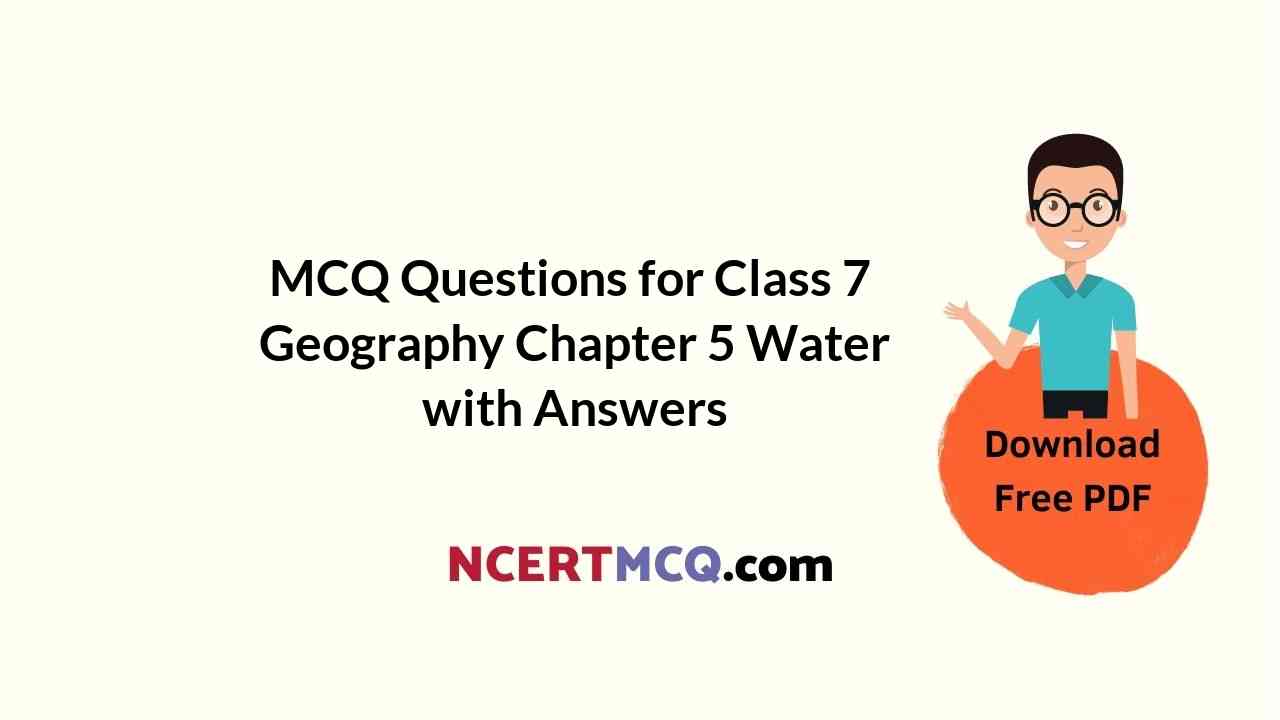Check the below Online Education NCERT MCQ Questions for Class 7 Geography Chapter 5 Water with Answers Pdf free download. MCQ Questions for Class 7 Social Science with Answers were prepared based on the latest exam pattern. We have Provided Water Class 7 Geography MCQs Questions with Answers to help students understand the concept very well. https://ncertmcq.com/mcq-questions-for-class-7-social-science-with-answers/
Class 7 Social Science Geography Chapter 5 MCQ With Answers
Geography Class 7 Chapter 5 MCQs On Water
Class 7 Geography Chapter 5 MCQ Question 1.
Which is the process through which water continuously changes its form?
(a) Water cycle
(b) Food cycle
(c) Rain
(d) All of these
Answer
Answer: (a) Water cycle
MCQ Questions For Class 7 Geography Chapter 5 Question 2.
Which water is salty?
(a) River water
(b) Pond water
(c) Rain water
(d) Sea water
Answer
Answer: (d) Sea water
Ncert Class 7 Geography Chapter 5 MCQ With Answers Question 3.
Which one of the following is an artificial enclosure for keeping small house plants?
(a) Terrarium
(b) Thermosphere
(c) Climate
(d) Evaporation
Answer
Answer: (a) Terrarium
Ncert Class 7 Geography Chapter 5 MCQ Question 4.
Sea water contains
(a) 97.3% of salt
(b) 2% of salt
(c) 0.68% of salt
(d) 0.973% of salt
Answer
Answer: (a) 97.3% of salt
Class 7 Geography Chapter 5 MCQ With Answers Question 5.
Which day of the year is celebrated as Water Day?
(a) 26 January
(b) 15 January
(c) 15 August
(d) 22 March
Answer
Answer: (d) 22 March
Class 7 Geography Ch 5 MCQ Question 6.
The movements that occur in oceans can be broadly called
(a) wave
(b) circulation
(c) water cycle
(d) all of these
Answer
Answer: (b) circulation
Geography Class 7 Chapter 5 MCQ Question 7.
Which is the Japanese word which means ‘Harbour Waves’?
(a) Tsunami
(b) Sea wave
(c) Ocean wave
(d) None of these
Answer
Answer: (a) Tsunami
Class 7 Chapter 5 Geography MCQ Question 8.
When did Tsunami strike the Indian ocean?
(a) 26 December, 2004
(6) 26 December, 2005
(c) 26 December, 2006
(d) 26 December, 2007
Answer
Answer: (a) 26 December, 2004
Water Class 7 MCQ With Answers Question 9.
The largest Tsunami wave travels at the speed of
(a) more than 700 km per hour
(b) more than 500 km per hour
(c) more than 250 km per hour
(d) more than 100 km per hour
Answer
Answer: (a) more than 700 km per hour
Class 7th Geography Chapter 5 MCQ Question 10.
The rhythmic rise and fall of ocean water twice in a day is known as
(a) tide
(b) wave
(c) ocean current
(d) none of these
Answer
Answer: (a) tide
Geography Chapter 5 Class 7 MCQ Question 11.
The Labrador and Gulf stream are the examples of:
(a) Tides
(b) Ocean currents
(c) Tsunami
(d) Waves
Answer
Answer: (b) Ocean currents
Match the contents of Column A with that of Column B
| Column A | Column B |
| 1. Spring tides | (а) Between Europe and Africa |
| 2. Gulf stream | (b) Cold current |
| 3. Labrador current | (c) Low tide |
| 4. Neap tides | (d) High tide |
| 5. Mediterranean sea | (e) Warm current |
Answer
Answer:
| Column A | Column B |
| 1. Spring tides | (d) High tide |
| 2. Gulf stream | (e) Warm current |
| 3. Labrador current | (b) Cold current |
| 4. Neap tides | (c) Low tide |
| 5. Mediterranean sea | (а) Between Europe and Africa |
Fill in the blanks with appropriate words:
1. The major sources of fresh water are rivers and ……………
Answer
Answer: springs and glaciers (Any one)
2. About ………….. % of water is present in the oceans and …………….. % as ice-caps.
Answer
Answer: 97.3, 02.0
3. The movements that occur in oceans are waves, …………. and ………….
Answer
Answer: tides, currents
4. …………. Point in the Andaman and Nicobar islands got submerged after the tsunami of 2004.
Answer
Answer: Indira
5. High tides help in ………….. and fishing.
Answer
Answer: navigation
6. …………. sea is the largest lake.
Answer
Answer: Caspian.
State whether the given statements are true or false.
1. We have about 0.68% of water as ground water.
Answer
Answer: True
2. Ocean water is calm and still.
Answer
Answer: False
3. Tsunami can be caused by underwater landslides.
Answer
Answer: True
4. Tides are highest on a full or new moon day.
Answer
Answer: True
5. Cold currents carry water from lower latitudes to poles.
Answer
Answer: False
6. Tides help in generating electricity.
Answer
Answer: True
We hope the given NCERT MCQ Questions for Class 7 Geography Chapter 5 Water with Answers Pdf free download will help you. If you have any queries regarding Water CBSE Class 7 Geography MCQs Multiple Choice Questions with Answers, drop a comment below and we will get back to you soon.
Class 7 Social Science Geography MCQ:
- Environment Class 7 MCQ
- Inside our Earth Class 7 MCQ
- Our Changing Earth Class 7 MCQ
- Air Class 7 MCQ
- Water Class 7 MCQ
- Natural Vegetation and Wild Life Class 7 MCQ
- Human Environment: Settlement, Transport and Communication Class 7 MCQ
- Human Environment Interactions: The Tropical and the Subtropical Region Class 7 MCQ
- Life in the Temperate Grasslands Class 7 MCQ
- Life in the Deserts Class 7 MCQ
